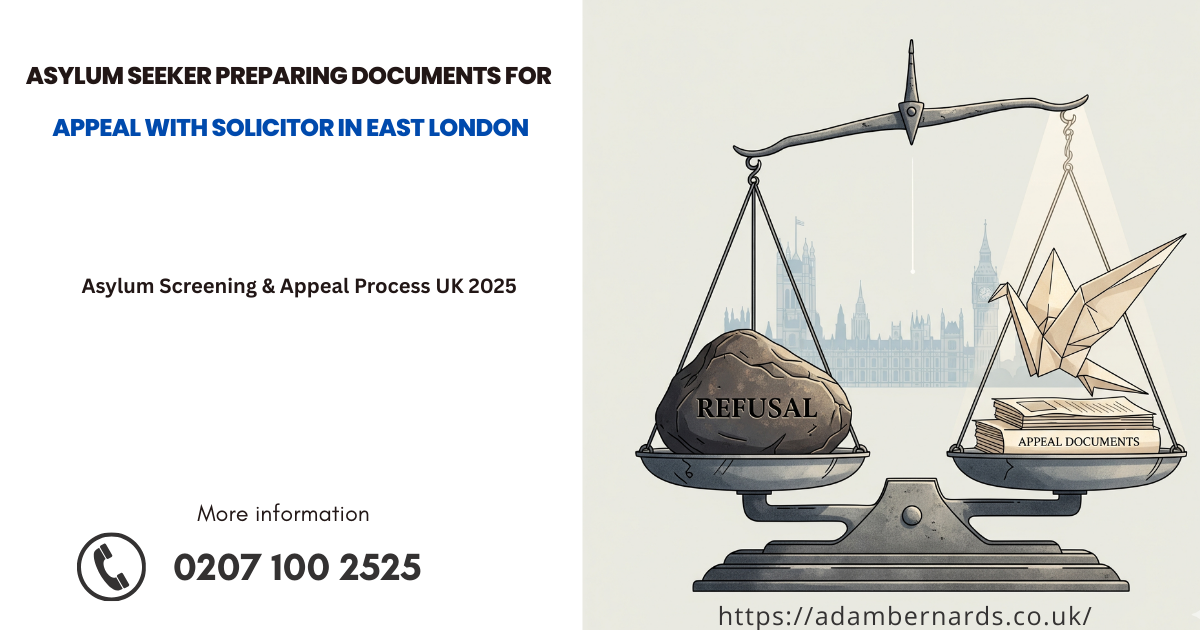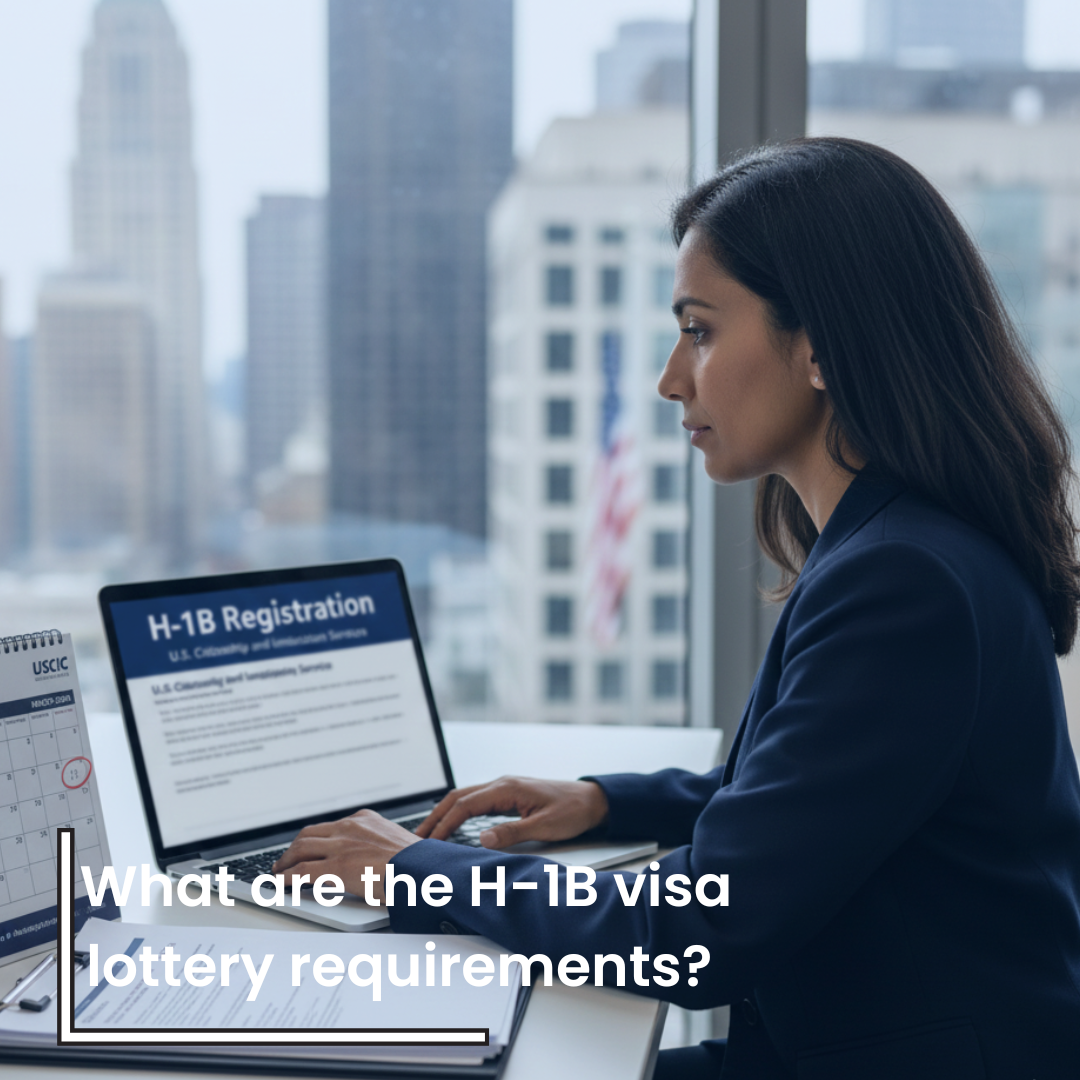How do I appeal an asylum refusal in the UK? Learn deadlines, forms, and the new 2025 fast-track appeal system explained by Adam Bernard Solicitors (London & East London).
In the UK, being denied refuge can be heartbreaking, but it’s not usually the end of the story. Every year, a large number of people successfully appeal Home Office asylum denials.
With locations in London and East London, Adam Bernard Solicitors assists people in contesting rulings and defending their legal rights. It’s more crucial than ever to act swiftly and adequately in light of the 2025 fast-track tribunal amendments.
The most often asked “how” questions by asylum applicants are addressed in this detailed handbook.
How Do I Know If I Can Appeal an Asylum Refusal?
The refusal letter from the Home Office will explain whether you have a right of appeal.
- Right of Appeal: You have the ability to file an appeal with the Immigration and Asylum Chamber.
- Without the ability to appeal ⇒ It might be necessary for you to submit an application for a Judicial Review, which has a three-month deadline.
How Long Do I Have to Appeal an Asylum Refusal in the UK?
Deadlines are strict:
- 14 days if you’re inside the UK.
- 28 days if you’re outside the UK.
Missing the deadline can seriously harm your case. Contact an immigration solicitor immediately.
How Do I Submit an Asylum Appeal in the UK?
To lodge your appeal:
- Fill out the appeal form, either on paper or online through MyHMCTS.
- Provide proof (e.g., witness statements, expert country evidence, medical records).
- Pay the fee (many appeals for asylum are excluded from paying it).
- This officially places your case into the tribunal system.
How Do I Prepare for an Asylum Appeal?
Being prepared is essential. A lawyer will:
- Examine the Home Office’s denial.
- Find any factual or legal mistakes.
- Gather evidence to back your claims.
- Your witness statement should be draughted.
- act as your representative in the tribunal.
How Does the Tribunal Hearing Work?
- You and your lawyer make your case.
- A Home Office representative supports the rejection.
- A judge or adjudicator renders a judgement.
Since 2025 reforms, some appeals are now heard by independent adjudicators in a fast-track system to cut delays.
What Happens After the Asylum Appeal Hearing?
The tribunal will send a written decision:
- Appeal Allowed → You may be granted refugee status or humanitarian protection.
- Appeal Dismissed → The refusal stands, but options remain.
What If My Asylum Appeal Is Refused Again?
You still have the option to:
- Appeal to the Upper Tribunal (if there was a legal error) if your asylum appeal is denied.
- Submit a Judicial Review application.
- Make a new claim and provide fresh proof.
How Has the Asylum Appeal Process Changed in 2025?
Key reforms include:
- Some tribunal judges will be replaced by independent adjudicators.
- expedite the appeals process to cut down on backlogs.
- Better planning is necessary due to tighter deadlines.
These changes mean applicants must be fully prepared with evidence from the start.
How Can a Solicitor Help With My Asylum Appeal?
At Adam Bernard Solicitors (London & East London), we provide:
- professional legal arguments and case analysis.
- robust collection of evidence.
- representation in higher courts and tribunals.
- assistance from new claims, judicial review, and appeals.
With careful preparation, many asylum refusals can be overturned.
How Can a Solicitor Help With My Asylum Appeal?
At Adam Bernard Solicitors (London & East London), we provide:
- professional legal arguments and case analysis.
- robust collection of evidence.
- representation in higher courts and tribunals.
- assistance from new claims, judicial review, and appeals.
With careful preparation, many asylum refusals can be overturned.
Conclusion: How Do I Win an Asylum Appeal in the UK?
Key steps to remember:
- Typically, you have 14 days to file an appeal.
- The Immigration and Asylum Tribunal hears appeals.
- Cases go more quickly in 2025 thanks to new fast-track procedures.
- Strong proof plus the backing of a solicitor increases the likelihood of winning.
Get in touch with Adam Bernard Solicitors (London & East London) right now if your asylum request has been denied. We will walk you through each step of the procedure.
Frequently asked questions
How do I appeal an asylum refusal in the UK?
If your asylum claim is refused, you may have the right to appeal to the Immigration and Asylum Tribunal. To appeal an asylum refusal in the UK, you must:
- Complete an asylum appeal form (online via MyHMCTS or by paper).
- Submit all supporting evidence such as medical records, expert country reports, and witness statements.
- Lodge the appeal within the deadline (14 or 28 days depending on where you are).
Having an asylum solicitor in London or East London can greatly increase your chances of success, as they prepare your legal arguments and represent you at the tribunal.
What is the deadline to appeal an asylum decision?
The asylum appeal deadline in the UK is very strict:
- 14 days if you received the refusal while inside the UK.
- 28 days if you are outside the UK when the refusal was issued.
Missing the asylum appeal deadline could mean losing your chance to challenge the decision. Always seek legal advice from an immigration solicitor in London immediately after receiving your refusal letter.
Can I submit an asylum appeal online?
Yes. Since 2025, most asylum appeals can be submitted online through the MyHMCTS system. This is the fastest way to lodge your case with the tribunal. However, paper forms are still available for those who cannot access online systems.
Submitting an asylum appeal online allows you to attach documents, witness statements, and legal arguments directly. A solicitor can ensure everything is completed correctly to avoid delays.
What documents do I need for an asylum appeal?
When appealing an asylum refusal in the UK, the following documents are essential:
- Your Home Office refusal letter.
- Passport or ID documents.
- Medical evidence showing physical or psychological harm.
- Expert country reports proving risks in your home country.
- Witness statements from friends, family, or NGOs.
- Proof of residence in the UK
Strong evidence is the key to a successful asylum appeal. Solicitors help gather expert reports and prepare documents that strengthen your case.
How long does an asylum appeal take in the UK?
The length of an asylum appeal in the UK depends on whether your case is processed under the standard tribunal system or the new 2025 fast-track process.
- Standard appeals may take several months due to the large backlog.
- Fast-track asylum appeals aim to deliver quicker outcomes, often within weeks.
Having a solicitor ensures your case is prepared properly so delays are minimised.
What is the new asylum fast-track tribunal system in 2025?
In 2025, the UK government introduced reforms to speed up asylum decisions. Key features of the new asylum fast-track system include:
- Some appeals heard by independent adjudicators instead of judges.
- Shorter waiting times to reduce the asylum backlog.
- A more streamlined tribunal process.
While the fast-track system offers quicker results, it also means applicants must be fully prepared with evidence from the start.
What happens if my asylum appeal is refused?
If your asylum appeal is dismissed, you still have legal options:
- Upper Tribunal Appeal – if the First-Tier Tribunal made a legal error.
- Judicial Review – challenge the lawfulness of the decision.
- Fresh Claim – submit new evidence that significantly changes your case.
At Adam Bernard Solicitors (London & East London), we help clients pursue every available option after a refusal.
Can I appeal to the Upper Tribunal after a refusal?
Yes. If your asylum appeal was refused by the First-Tier Tribunal, you can apply for permission to appeal to the Upper Tribunal. This is only possible if there was a legal error or mistake in how your case was handled.
An immigration solicitor can identify these errors and prepare your application for the Upper Tribunal.
What is the difference between asylum appeal and judicial review?
- Asylum Appeal → Challenges the Home Office’s decision on the facts and evidence of your asylum claim.
- Judicial Review → Challenges whether the decision-making process was lawful, not the facts themselves.
Do I need a solicitor for an asylum appeal in the UK?
While it is possible to appeal without legal help, having an experienced asylum solicitor in London greatly increases your chance of success. Solicitors:
- Analyse the Home Office refusal letter.
- Collect and prepare evidence.
- Draft strong legal arguments.
- Represent you at tribunal hearings.
At Adam Bernard Solicitors (London & East London), we specialise in asylum appeals and judicial reviews, providing expert support at every stage.
















